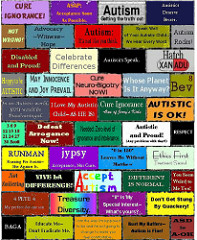Life, they say, is a crap shoot; you never know what you’re going to get, and eventually you’ll lose and your life will be over. A little grim sounding, but not necessarily fatalistic, not like the whole concept of predestination. I’ll take free will any day. But that’s free will guided by inner moral responsibility, not by fear of hellfire and damnation. Though not explicit, there’s still that undercurrent of hellfire and damnation in the various flavours of xenophobia being flung about. (“Xenophobia” means fear of the Other, not fear of Xena, Warrior Princess.)
Sometimes it’s the covert version that seeps through schools in a fog of viscous cliques targeting whatever groups are considered to be outsiders, such as gays or geeks. What most people didn’t seem to realise or acknowledge was that you didn’t actually have to be gay, lesbian, bisexual or transgendered to be slammed as a “fag”, “homo” or “fairy”. Anyone could be a target for verbal and/or physical violence just because someone else was uncomfortable around them, for whatever reason. It wasn’t, and never is, an issue about “asking for it” because of who you are or what you did. A few times the roll of my cosmic dice meant having to lose a turn, or go back a few spaces. I fared far better as a target of bullying than did Matthew Shepherd. It was fortunate the roll of the dice was with me, because my family and the school administration all dismissed my protests. Sexism and homophobia were so endemic as to be nearly invisible, and therefore my protests were unfounded and unimportant.
Sometimes the xenophobia is much more overt, like when I went to get the morning newspaper and found a recruitment flier from the Ku Klux Klan tossed on my driveway, and my neighbors’ driveways. What had caused them to distribute on our block was a mystery, but this event made me realise that such things were not “long ago and far away” but rather much closer to my part of the space-time continuum. Chilling as it was, they were just icky pieces of paper, which presence led to much noisy indignation by citizens writing in the local newspaper. When I rolled my dice that time, I merely had to pull a card from the Chance deck.
Less overt, but equally disturbing was the semester where I took a horticulture class from an adjunct teacher who made answering a test question correctly require repeating some of his anti-evolution propaganda. That didn’t go over well, either. I would like to say that I was particularly noisy on this issue with the department head, but at the time I was still laboring under a lot of that learned helplessness with authority. Fortunately, a few others in the class didn’t suffer that problem, and were able to advocate effectively.
More recently we took a group of students on a museum trip, and passed by the Westboro Baptist Church gang who were staging yet another protest. Phelps’ followers are plenty damn overt, but they’re such an obnoxious fringe group that they don’t garner much solidarity from the public at large. Our dice roll led our tokens past, and we didn’t have to stop and roll again to calculate hit points.
In such cases, fear, hate and loathing are the things being sold. However, few groups are really that upfront about what they are selling. There’s plenty of noise to be heard about the “wages of sin” but little about the “profits of hate”. (Ah, a roll of the cosmic dice says that we get to take our game token past the Tired Joke square where we would have nattered about profits & prophets, and we’ll land on the next square, where instead we lose a turn from having to define our terms.)
Both the words “ecology” and “economy” come from the Greek Oikos, meaning “house”. In general definition, ecology refers to the relationships of organisms and their environments, and economy refers to the management of money and other resources. (Curiously, you’ll hear more about the economies of natural systems in ecology than you will hear about the ecologies of natural systems in economics. We might say that ecologists are more likely to look for numbers in their bugs than economists are to look for bugs in their numbers. Apparently I’m getting a little bleed-over from the Tired Joke square; humor is one of the ways that people cope with fear and stress.) Part of the economy of human ecosystems is the trade we do in forming relationships by in-grouping and out-grouping, and how we create business opportunities by buying and selling ideas and identities. You bet we buy and sell ideas and identities — that’s what the fields of advertising and public relations are all about.
All of these events from my personal history revolved around selling something to others. A hate group is formed by someone who finds others with similar sentiments, and as a group, they reinforce each other’s opinions and self-worth. But being a closed system, they can run out of energy, so the group then has to recruit others. Recruitment at the next larger scale means having to define who they are, and not just by who or what they are against. They must distinguish themselves with a distinct group identity, adding on cultural facets such as creating a semi-mythological history, an in-group jargon, special symbols, and rituals. Much of this is done by elaborating upon who they hate, and why they hate them, and importantly, why the out-group is “deserving” of hatred. Once again, because the group is a closed system, they can start to run out of energy, so they must keep themselves going by taking things to the next step and acting out against their targets, first verbally, and then some hate groups will cross the line into acting out physically against the target’s possessions, and finally attacking people.
There’s a thin line between hating what the outgroup represents or what the outgroup has, and hating people simply because they are designated as the outgroup.
Just having a hate group isn’t always socially profitable. To gain power to bolster their self-worth as a group and as individuals, they have to increase the group size. But as long as the group is perceived as being on the fringe, their market share is limited. The hate-group will be self-limiting as long as they go around frothing at the mouth and yelling, “Because you know, They are amoral and unless stopped by decent folk, They will take your jobs and steal your wimmenfolk and convert your chilluns and be a drain on taxpayers. And of course, end civilisation as we know it!”
Instead, the hate group must create a more mainstream image. They must appeal to fear in small, palatable, almost sensible doses, accentuating the overlaps of the hate group’s position with more common political or social leanings, and avoiding mention of its extremes. Dosage is important — the poison is always in the dosage, and some poisons are cumulative.
Taking a cue from the fields of advertising and public relations, they sell not just fear, but also add in dollops of scientific veneer or pseudo-intellectualism to make the message seem more reasonable or have “truthiness”. In other words, to become mainstream they must appear to be less rabid and more professional. Perhaps they’ll even repackage the message to be perceived as performing some kind of social service, educational benefit, employment or economic safeguard.
Be wary. Because a great many people believe that xenophobia is so worth fighting for. But don’t be afraid — in reality, there are NO outgroups. We are all human beings, endless variations upon a genetic theme.
“In the end,
we will conserve only what we love,
we will love only what we understand,
and we will only understand what we are taught.”
~Baba Dioum








Catana said,
26 June 2007 at 14:42
Bravo! Great analysis, beautifully stated.